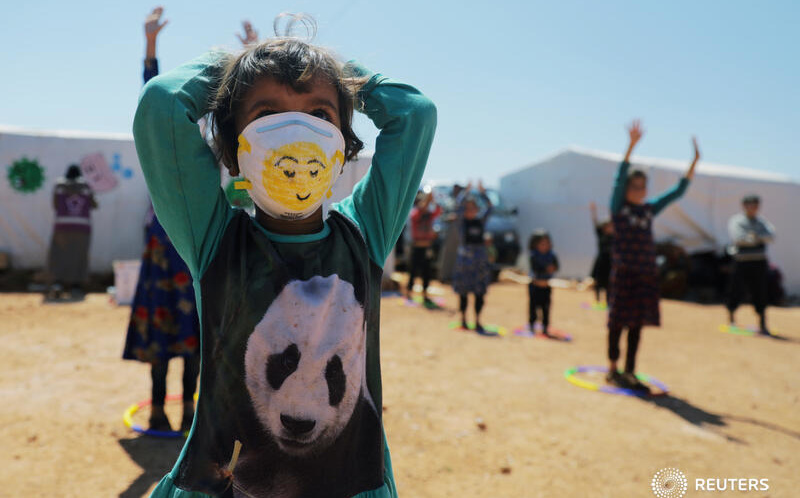A girl takes part in an event to spread awareness of Coronavirus and encourage safety at a camp in northern Idlib Province, Syria, April 14, 2020 (Khalil Ashawi/Reuters)
“It’s a very small thing we can do, but the need is so huge. We are trying to do our best.”
Fuad Sayyed Issa is the founder of the Violet Organization, an aid group helping civilians in Idlib Province in northwest Syria. He is telling the New Arab’s Danya Hajjaji of the changing role of the volunteers, who began by delivering food packages, as the opposition-held northwest — holding out for years against Russian-regime attacks — now faces the outbreak of Coronavirus.
Last month the organization trained more than 200 volunteers for a task force to help fend off the virus. They are sterilizing hospitals, public health centers, and displaced persons’ camps. Hygiene kit with masks and hand sanitizers have been given out to more than 5,000 people. Health workers have been provided with more than 500 packs of personal protective equipment.
The volunteers are also preparing rapid response measures, including emergency evacuations, if the virus begins to spread. They have set up more than 160 triage tents near hospitals and clinics across Idlib and Aleppo Provinces.
There have launched Violet's Trainings for the responses concerned with Corona Virus through qualifying tens of paramedics specified for saving the infected or likely to be so , with specialist teams of sterilization. pic.twitter.com/eKSSBjRiQJ
— Violet Organization – منظمة بنفسج (@org_violet) March 16, 2020
The difficulties are great. A Russian-regime offensive between April 2019 and March 2020 killed about 2,000 civilians and displaced more than 1 million as it seized part of Idlib and all of neighboring northern Hama Province. Some have returned to homes, but their towns and villages have been devastated by bombing and shelling.
Awareness campaigns encourage the displaced, who live amid poor sanitation and little running water, to maintain personal cleanliness.
But Issa says those trying to survive may not have the option of social distancing: “If we tell them ‘You must stay home and you must stop working’, they might die of hunger.”
Still, the Violet Organization is accustomed to the challenge. Issa, then 16, his father, and three friends started the aid group in 2012. Today it has about 2,000 employees and 1,000 volunteers, working with partners such as the UN and Save Children on food security, shelter, education, and health.
The Assad regime has targeted Violet’s facilities with shelling, displacing more than 100 volunteers. In June three employees were killed when their ambulance, taking a patient to a hospital, was bombed by pro-Assad forces assaulting the town of Ma’arat al-Num’an.
See also Syria Daily, June 20: Regime Attacks Kill 20 in Northwest
Many Violet staff are now living in the displaced persons’ camps. They deal with medical staff who have few resources for any outbreak. There is only one machine to test for the virus and no lab to process results. With more than half of Idlib’s medical facilities damaged or destroyed by about 70 Russian-regime bombings in the past year, only 153 ventilators and less than 200 beds in intensive care are available.
The plight only increases the determination of the aid workers. Majd explains the efforts to protect the civilians and concludes simply, “If anything happens here, it will have a big impact on children.”
WATCH: How our partners in North West #Syria @org_violet are preparing for #Coronavirus #Covid_19 #ProtectAGeneration pic.twitter.com/XFsMCF6TKm
— Save the Children Global Media (@Save_GlobalNews) April 19, 2020
“

